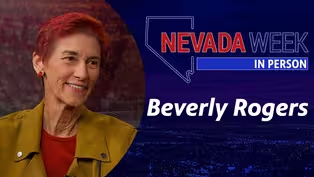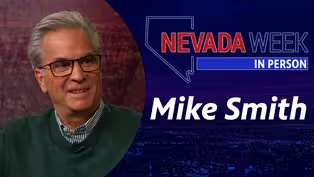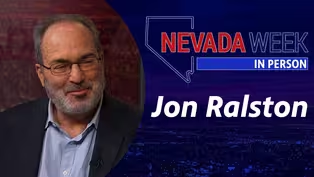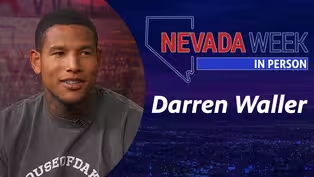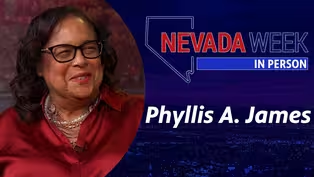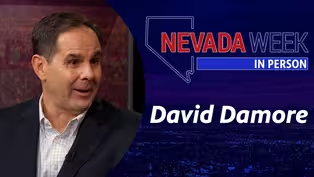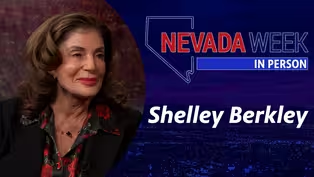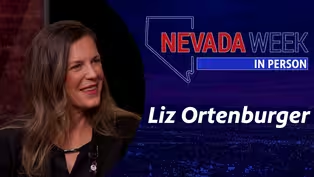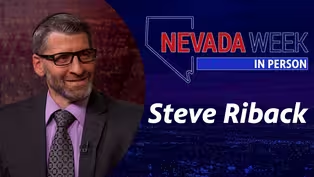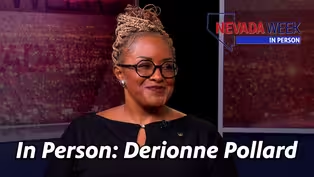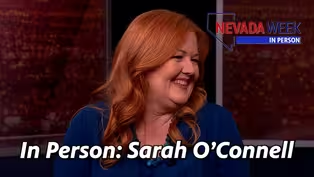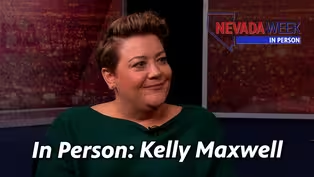
Nevada Week In Person | A’Esha Goins
Season 1 Episode 35 | 14mVideo has Closed Captions
One-on-one interview with cannabis equity advocate A’Esha Goins.
One-on-one interview with cannabis equity advocate A’Esha Goins.
Problems playing video? | Closed Captioning Feedback
Problems playing video? | Closed Captioning Feedback
Nevada Week In Person is a local public television program presented by Vegas PBS

Nevada Week In Person | A’Esha Goins
Season 1 Episode 35 | 14mVideo has Closed Captions
One-on-one interview with cannabis equity advocate A’Esha Goins.
Problems playing video? | Closed Captioning Feedback
How to Watch Nevada Week In Person
Nevada Week In Person is available to stream on pbs.org and the free PBS App, available on iPhone, Apple TV, Android TV, Android smartphones, Amazon Fire TV, Amazon Fire Tablet, Roku, Samsung Smart TV, and Vizio.
Providing Support for PBS.org
Learn Moreabout PBS online sponsorshipMore from This Collection
Nevada Week In Person goes beyond the roundtable discussion of Nevada Week with guests for a more casual conversation about their personal passions, new projects and compelling stories that are overlooked in the flurry of the news cycle.
Nevada Week In Person | Beverly Rogers
Video has Closed Captions
One-on-one interview with Rogers Foundation chair Beverly Rogers. (14m)
Nevada Week In Person | Mike Smith
Video has Closed Captions
One-on-one interview with Las Vegas Sun political cartoonist Mike Smith. (14m)
Nevada Week In Person | Jon Ralston
Video has Closed Captions
One-on-one interview with The Nevada Independent CEO Jon Ralston. (14m)
Nevada Week In Person | Darren Waller
Video has Closed Captions
One-on-one interview with Las Vegas Raider tight end Darren Waller. (14m)
Nevada Week In Person | Phyllis A. James
Video has Closed Captions
One-on-one interview Phyllis A. James. (14m)
Nevada Week In Person | David Damore
Video has Closed Captions
One-on-one interview with Chair of the Department of Political Science at UNLV David Damor (14m)
Nevada Week In Person | Shelley Berkley
Video has Closed Captions
One-on-one interview Senior Vice President for Touro University Shelley Berkley. (14m)
Nevada Week In Person | Liz Ortenburger
Video has Closed Captions
One-on-one interview with SafeNest CEO Liz Ortenburger. (14m)
Nevada Week In Person | Steve Riback
Video has Closed Captions
One-on-one interview with Las Vegas Metro Police Lieutenant Steve Riback. (14m)
Nevada Week In Person | DeRionne Pollard
Video has Closed Captions
One-on-one interview Nevada State College President DeRionne Pollard. (14m)
Nevada Week In Person | Sarah O’Connell
Video has Closed Captions
One-on-one interview with Director of Eat More Art LLC Sarah O’Connell. (14m)
Nevada Week In Person | Kelly Maxwell
Video has Closed Captions
One-on-one interview with Baby’s Bounty Executive Director Kelly Maxwell. (14m)
Providing Support for PBS.org
Learn Moreabout PBS online sponsorshipA social impact consultant, cannabis policy specialist, and birth work advocate, A'Esha Goins joins me this week for Nevada Week In Person.
♪♪♪ Support for Nevada Week In Person is provided by Senator William H. Hernstadt and additional supporting sponsors.
Welcome to Nevada Week In Person.
I'm Amber Renee Dixon.
She's the Chair of Nevada's Cannabis Advisory Commission Subcommittee on Social Equity, Diversity and Inclusion.
She's also the founder of Black Joy Consulting, a consulting service for businesses and nonprofits looking to maximize the good they do in their communities.
A'Esha Goins, thank you for joining us for Nevada Week In Person.
-(A'Esha Goins)Thank you for having me.
I appreciate it.
-So many titles that you have.
Let's dive into the cannabis industry, the equity aspect of it.
Where does your passion for that stem from?
-My passion stems from I have an uncle, and when I was really young, he was supposed to go to college.
And he was coming out of high school, he had a butt of a joint in his car.
He hadn't even been smoking, and he was pulled over and put in jail.
And I-- That's my favorite uncle.
It's my dad's baby brother.
And I spent most of my adolescence having to visit him in prison.
And so, you know, when you watch-- It was traumatic for me.
But then also my baby cousins, because I'm the eldest cousin, they also grew up without their father.
And they were in and out of jail.
And so when it came time to get into cannabis and I realize, you know, the two, you kind of, something happens and you get that through line.
And I was like, Oh, no.
This this can't happen anymore.
-So you fast forward, and marijuana is legal now in so many states.
People are profiting off of it; yet people in your own family suffered as a result of punishments from it years and years ago.
-Yes.
-So how does that work, social equity within the cannabis industry?
How do you achieve that?
-I mean, does it work?
I think that there is-- I love a good strategy.
I consider myself a strategist; I love a good strategy.
And I think social equity is the strategy to having some inclusion and offering persons like me opportunities into the industry.
But I don't-- We're all seeing that it's an idea, but it's not necessarily working.
-What are the barriers to it not working?
-The barriers are there's no money; in most places, there's no money.
You need a lot of wraparound services, mentoring, you're gonna need some education.
So there's a lot of different things that go along with having persons who are impacted by the war on drugs being an industry.
And in most cases, and especially in our state, there's not enough idealism to go along with it.
-So you are on the advisory subcommittee that advised the Nevada Cannabis Compliance Board about how to implement social equity in cannabis consumption lounges.
Part of that was setting aside 10 applicants for social equity applicants.
How do you define a social equity applicant?
-I define it the same way the State does, persons impacted by the war on drugs.
Yes.
-Okay.
So these licenses are set aside for them.
It's expensive-- -It's expensive, and we don't really know-- - --to get into the cannabis industry.
-Yes, yes.
We haven't even seen how expensive it is, right?
So when we're talking about consumption lounges, specifically, and there's a requirement to have $200,000 just to be in the licensing, to get a license, that doesn't even cover how much they're saying it's going to be to have to have the ventilation system if you're going to have combustible cannabis.
So this doesn't say how much real estate is going to be, how much employment, how much all the rest of whatever a business model is going to be.
This literally is just saying to get a license is 200,000.
And you're gonna need this ventilation system, and that's about 200,000.
So it's expensive.
-Financing, traditional financing for minorities has historically been tough.
How are people gonna get money for this?
-I mean, that's the question.
It really is gonna take investors, right?
Because it all has to be private funding.
And then we're hoping that-- -Private funding because marijuana is still illegal federally?
-Illegal, yes.
-You cannot get financing through a bank-- -Exactly.
- --to fund a business.
-And so what we're hoping is that those individuals attract investors that aren't predatory.
But then how do we combat predatory investing?
So it's scary.
To me, it's all just kind of idealistic.
-Is it a start?
-It's absolutely a start.
Because in the state of Nevada-- I love my state, but in the state of Nevada, this is the first time social equity has been designated, period, for any industry.
So this is a start to, I believe, to see some things change.
-What would you advocate for?
What's the most practical pathway to ownership for minorities in the cannabis industry?
-There needs to be microbusiness models, small business models.
CEIC, the org that I also founded the last legislative session-- -What does that stand for?
-Cannabis Equity and Inclusion Community.
-Okay.
-We presented a bill called the Pop-up Cannabis Vendor bill.
And the idea is that there's a low barrier to entry because you don't have to be brick and mortar.
In that bill also had you could be a host.
So you could host events that would be sanctioned by the Cannabis Compliance Board.
So now we're talking about a license that normally would-- You have to think about it in the idea of like a beer and wine model, a pop-up beer and wine model.
So now we're talking about going from $200,000 to probably 40- or 50,000 which is manageable for an individual that is just living a regular life that works a regular job.
-That bill did not get through.
I think consumption lounges were the priority?
-Yes, consumption lounges were the priority, respectfully, because Assemblyman Yeager had worked on that bill, and this was the second session.
You know, we only go every other year.
So-- And there was a need to have a place for people to consume.
And I recognize that need along with the persons who are in federal housing; because if we hadn't passed this bill, then those persons could likely be positioned where their housing would be in jeopardy.
So consumption lounges were important.
It's just unfortunate that social equity, specifically, was designated to that license.
-Explain further about the federal housing.
-So because marijuana is still illegal federally, if you are in federal housing, you're putting your livelihood in jeopardy by consuming.
So although it's legal in the state and you can consume in the privacy of your home, if your home is federally funded, then you could be evicted.
-So that's something you're going to be working on-- -Yes.
- next legislative session?
-Yes.
-How did you get involved in lobbying?
-That's funny.
I really helped with Yes on 2.
I helped with the Yes on 2 campaign.
And then afterwards, I was like-- -Which was?
Yes on 2 was?
-Yes on 2 was to legalize cannabis like alcohol, which is what we're living in the world now, right?
And when that campaign was over, I came back to the office -- because I was working in the dispensary at the time -- and I was like, Wait a minute.
There's no people that look like me in this industry.
And I was like, I'm gonna go and figure this out.
So I went-- This literally happened.
I went to session that next session, it was like just hitting the streets.
How do I find out?
How do we change this so that there's more people looking like me?
And I just knocked on doors.
And people started helping me, and they were like, You got to do this, you got to do that.
And that's how I ended up lobbying.
-Knocking on doors at the legislature?
-Yes.
Because my parents always taught me that the government works for us; we don't work for it.
And that's been very constant in our household.
So I wasn't afraid to have my voice heard.
I just didn't know what avenue I should be going about doing it.
And to be honest, I didn't know I was lobbying.
I just knew that something needed to change, and I needed it to change.
It wasn't-- I think I was like, in my third week, and someone was like, you know you got to register as a lobbyist.
I was like, What?
I got to do what?
So yeah, I just did it because I knew something needed to change.
And if no one was gonna do it, I was going to.
-You lobby for birth work, as well.
What is birth work?
-Birth work is the doulas and midwives.
They are the, what we would call "traditional birthers."
Because, you know, as humans, we are the only people that actually go somewhere to birth our children.
We're the only mammals that do that, but having a baby is very natural.
And so what doulas and midwives do is they help us have natural births.
-So offering an alternative to the hospital system.
-Yes.
-Why is that important for minorities, in particular?
What is the equity situation like with prenatal care?
-You know, there is a Black mortality rate, and it's-- What they say is Black women are three times more likely to die in giving birth.
And that's scary.
It should be scary for anyone, right?
But what really happens is we have a health equity problem.
And what that means is when we go to the doctors, they don't see us the same as they see other people.
So whereas I may say that I'm having a difficult pregnancy, they don't hear my voice in the same way that they may hear your voice.
And so what midwives do is midwives help you through that and also give birth.
Midwives' focus is the birthing of the children.
What doulas do is they're advocates.
They're just service providers.
They really are like a cheerleader for you.
And so what doulas will do is help guide you along, reinforce that it's okay that you feel the way that you feel, and then walk you along so that when it's all said and done, you have these two people working together that introduce a space where you're probably more likely to give birth safely.
-What were you able to accomplish in the last legislative session surrounding birth work?
-So I was with Make it Work Nevada at the time.
Shout out to Erika Washington and Quenton Savwoir, because he was an advocate on this bill, as well.
Assemblywoman Shondra Armstrong presented a bill where we were able to have doulas reimbursed through Medicaid.
-Wow.
-Yes.
And it is so huge because, number one, it is the first time that the State has recognized doula as an actual business or as a service provider.
So that's huge, because that's saying that birth work matters.
Secondly, now we're able to say that these persons who normally wouldn't have access can now ask for someone to advocate on their behalf.
So I think it's-- You know, we don't take into account all the things that go with reproductive justice.
There's so many things that are engaged in that, but access truly for Black and Brown women is more important than anything, because we don't feel like we're seen in the health care business.
We don't feel like our voice is being heard.
So having a doula help advocate for that, I believe, is the beginning of making strides to changes.
Nevada first, but worldwide later.
-What about midwives and Medicaid reimbursement?
-So midwifery in Nevada, I know Assemblywoman Daniele Monroe-Moreno, last legislative session, she was able to get birthing centers.
So now we have what you call birthing centers.
But midwifery still hasn't been fully recognized in the industry, or I should say, in the practice of medical, because they're not medical.
That's really where the dynamics happen.
And so the goal is for next session, she's going to ask for the State to ask for midwifery to be a designation so that they can practice openly, as well.
-But doula is considered medical?
-Doula is not a medical.
They only are a service provider.
So it's the same as having help at home for your grandparent.
They're along that same line.
So they're not-- They don't do medical services.
-But they're still able to get reimbursed by Medicaid?
-Yes.
Yes, yes.
-Interesting.
You are a mommy?
-I am a mom.
-How did you give birth?
-Well, actually, my son was adopted.
-Oh, wow.
-Yeah.
My son, I have an 18 year old; he's 18 now, and he was adopted.
So I-- The reason why birth work matters to me isn't because of me having a child, it has more to do with seeing the iniquities and not really understanding altogether what the iniquities were.
Just someone saying in a moment, Did you realize that this is happening?
And I was like, What?
What do you mean this is happening?
And that's how I leaned in, because I always want to be the person for the voice of me, right?
And there was a time where I didn't feel like I had a voice or anyone could hear me.
So I always want to offer the opportunity to be that voice.
-Last question very quickly.
On your Twitter profile, you have a lot of descriptions, but also "mischievous" in there.
Why?
-Because I tend to just be a little brat.
So if you want anything to happen that you think is going to be silly and fun, I'm the one.
-A'Esha Goins, thank you so much for joining us for Nevada Week In Person.
To see this week's edition of Nevada Week, go to vegaspbs.org/nevadaweek.
♪♪♪

- News and Public Affairs

Top journalists deliver compelling original analysis of the hour's headlines.

- News and Public Affairs

FRONTLINE is investigative journalism that questions, explains and changes our world.












Support for PBS provided by:
Nevada Week In Person is a local public television program presented by Vegas PBS
